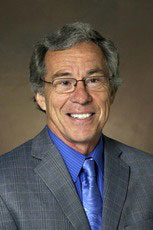| Posted: June 23, 2009 |
Pederson named director of NDSU's Center for Nanoscale Science and Engineering |
|
(Nanowerk News) Larry R. Pederson has been named director of the Center for Nanoscale Science and Engineering (CNSE) at North Dakota State University, Fargo. The appointment of Pederson was announced by Philip Boudjouk, vice president for research, creative activities and technology transfer at NDSU.
|
 |
| Dr. Larry R. Pederson has been named director of the Center for Nanoscale Science and Engineering at North Dakota State University, Fargo.
|
|
Dr. Pederson most recently held the position of laboratory fellow, the highest of six scientific grades in the Energy and Environment Directorate at Pacific Northwest National Laboratory (PNNL) in Richland, Wash. At PNNL, Pederson managed the High Temperature Electrochemistry Center/Solid State Energy Conversion Alliance Coal-Based Systems Core Research program, in collaboration with Montana State University and the University of Florida. In addition, he is past director of the Materials Department at PNNL.
|
|
Pederson has published approximately 140 journal articles and conference papers, and holds five U.S. patents and three patents pending. He also holds 16 foreign patents. The focus of Pederson’s most recent research includes materials development for electrochemical applications including solid oxide fuel cells, electrochemical sensors and lithium batteries. Such research is relevant for NDSU CNSE’s core competencies in materials development for electronics and energy conversion applications.
|
|
“CNSE continues to build upon its national and international reputation for research in microelectronics, coatings, nanotechnology, robotics and other areas,” said NDSU President Joseph A. Chapman. “Dr. Pederson brings a wealth of scientific knowledge and experience to lead CNSE into its next phase of development.”
|
|
Pederson moves into the position most recently held by Dr. Gregory McCarthy, who now serves as director emeritus and associate vice president for interdisciplinary research. McCarthy served as director of CNSE since its inception in 2002.
|
|
“Dr. McCarthy provided CNSE with leadership during its crucial initial phases and has lead the organization from its start with five employees to more than 60 full-time employees and $18 million in annual research activities today,” said Philip Boudjouk, NDSU’s vice president for research, creative activities and technology transfer. “As CNSE continues to grow, Dr. Pederson’s leadership will assist us in developing innovative technologies while building partnerships and opportunities for researchers, faculty and students.”
|
|
“I find the technical breadth and quality of research and development activities being conducted at CNSE to be truly impressive. I look forward to working with the talented staff and faculty of CNSE to identify technical thrusts, procure funding, establish strategic partnerships and build upon the opportunity to attract outstanding researchers and students while expanding research facilities and capabilities,” said Pederson.
|
|
Through the course of his distinguished career in scientific research, Pederson has secured significant research funding from both governmental and private sectors, including $28M for the High Temperature Electrochemistry Center at PNNL since 2002. Other significant research efforts directed by Pederson include: solid oxide fuel cell degradation studies, automotive nitrogen oxide sensor development, lithium ion battery development, microchannel multi-fuel steam reformer development, fuel cell materials development, Nafion-based gas sensors, adhesive bond failure, advanced electronic materials for energy conversion applications, and safety issues relevant to radioactive and chemical tank wastes.
|
|
|
|
Pederson’s research team received an R&D 100 and Federal Laboratory Consortium Technology Transfer award for developing a unique technology for producing ultrafine ceramic powders that improve the manufacture of solid oxide fuel cells and many other important products. The R&D 100 award from R&D Magazine honors inventors by identifying the 100 most technologically significant products and advancements for each year and recognizing winning innovators and their organizations.
|
|
Pederson received his Ph.D. in chemistry from the University of Wisconsin-Milwaukee with a minor in physics and received his bachelor’s degree in chemistry from Bemidji State University, Bemidji, Minn. He also has served as research advisor for 15 master’s and Ph.D. graduate students in Missouri, Illinois and Washington. In addition, he taught graduate and undergraduate classes in materials science while serving as an adjunct professor at Washington State University.
|
|
NDSU's Center for Nanoscale Science and Engineering, Fargo, conducts multidisciplinary research with partners in the governmental, private and university sectors. CNSE's scientific capabilities include bioactive materials, combinatorial science, corrosion protection, electronics miniaturization, flexible electronics and materials, hard coatings, wireless sensors and radio frequency identification (RFID). The Center also develops protective coatings for ships and aircraft. CNSE has been recognized in various publications including Wired magazine and The Financial Times. It is located in the NDSU Research & Technology Park, along with the Center for Advanced Electronics Design and Manufacturing, the Center for Integrated Electronic Systems, the Center for Surface Protection, the Center for Nanoscale Energy-Related Materials and the NDSU Product Design Center.
|

